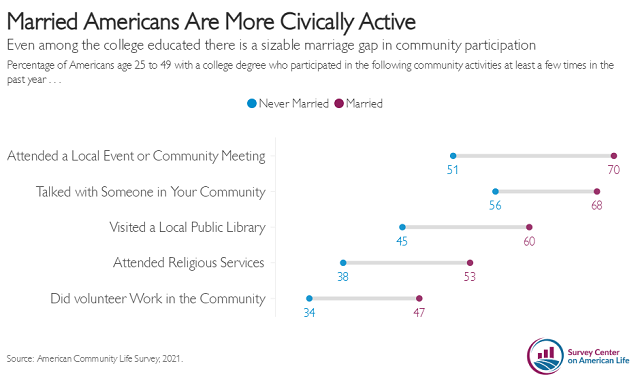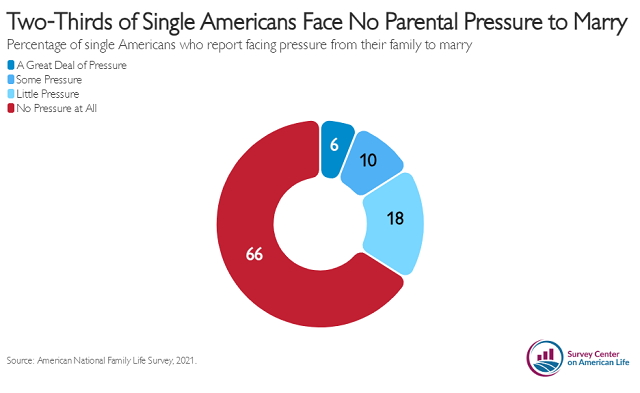Highlights
- Marriage is positively associated with greater community involvement across a range of different activities. Post This
- Two-thirds of single Americans report that they have felt no pressure from their family to get married. Post This
- For young people uncertain about whether getting married or starting a family is worth it, American culture offers little in the way of reassurance. Post This
Marriage rates are plummeting. More young people are delaying or avoiding dating altogether. Pew Research recently found that 1 in 4 40-year-old American adults have never been married. Parenthood is viewed with much greater apprehension among young people than it once was.
Young women express growing reservations about starting families, and many believe marriage benefits them less than it does men. One Pew study found that less than half (45 percent) of young women (age 18 to 34) without children say they still want to have kids at some point in the future. Among young men, nearly 6 in 10 (57%) report that they want to be fathers.
These facts induce heartburn among conservatives but elicit little more than a shrug from many liberals. Sixty percent of conservatives believe the decline of marriage represents a negative development for American society, a view shared by only 17% percent of liberals. Roughly as many liberals believe that fewer people getting married is a “good thing” for American society.
A 2019 Pew survey found a similar ideological divide in views about marriage. More than three-quarters (76%) of conservatives believe that “society is better off if couples who want to stay together long-term eventually get married.” Only 31% of liberals affirm this view. Most say “society is just as well off” if these couples decide not to marry.
But it does matter. Marriage is positively associated with greater community involvement across a range of different activities.
In our surveys, there is a substantial divide in community activities between married and unmarried adults. This is not just an artifact of age or education differences either. Married adults between the ages of 25 to 49 are far more likely to attend a community meeting, do local volunteer work, and visit a library. They talk to new people in their communities more often as well.

Even controlling for age, race, education, and gender, marriage is positively associated with more frequent participation in a variety of community activities. Simply put, married people are more active participants in American civic life.
None of this is new. Brad Wilcox and Hal Boyd summarized this relationship well in The Atlantic in 2020:
It turns out that the relationship between nuclear families and larger communities is more symbiotic than substitutionary, more interdependent than interchangeable. Whatever the merits of extended or other nonnuclear forms of family life, research has yet to show that they are entirely equipped to shoulder the unique role of a child’s two parents.
In our self-obsessed culture, much of the debate around marriage has focused on what the institution offers individuals. Does it make me happier? Feeling more fulfilled? But research shows that marriage is a critical component to establishing healthy, connected communities. The personal benefit that marriage provides is certainly important, but a national conversation about the decline of marriage requires that we understand the consequences it has for the nation.
Lack of Societal Support
The dispiriting part of all of this is the gap between the positive impact marriage provides individuals and communities and the indifference expressed by many political and cultural institutions to it. For young people uncertain about whether getting married or starting a family is worth it, American culture offers little in the way of reassurance.
Social media is exceptionally adept at exploiting our anxieties and uncertainties. When it comes to dating, marriage, and parenthood, social media platforms promote an overwhelmingly negative narrative. Stories of infidelity, relationship woes, and parental hardship abound. The national news environment is not much better. National media editors eagerly publish articles about the limitations of marriage, the benefits of divorce, and fringe lifestyles, such as polyamory. A few recent headlines in the New York Times “Modern Love” section include: “Un-Marry Me!,” “Don’t Marry Your Boyfriend,” and “When a Breakup is An Act of Self-Love."
It’s not just the culture that’s the problem. The economic costs of raising a family are rapidly mounting. A recent study found that the average cost of child care increased by 32% since 2019. What’s more, the economic burdens of raising a family are not equally shared. Women pay a steep price when they choose to start a family. Research has found that upwards of 80% of the gender pay gap is attributable to women becoming parents. For college-educated women seeking to maintain a career and start a family, these realities are impossible to ignore.
For their part, federal lawmakers are not offering much leadership either, at least not in ways that count. Senator Ron Johnson (R-WI) argued in an interview last year that it is not society’s responsibility to help families: “People decide to have families and become parents; that’s something they need to consider when they make that choice.” In the absence of any assurances, it seems clear which decision an increasing number of young people will make.
One reason is that young adults today feel less pressure than ever to marry. Two-thirds of single Americans report that they have felt no pressure from their family to get married. For the growing number of young people raised outside religious communities, it’s likely that they do not often hear forceful arguments in support of marriage or parenthood.

Although conservatives more readily identify the problem of marital decline, it’s not clear that young conservatives are any more interested than liberals in long-term commitments. Or that liberals do not believe there are any benefits to marriage or parenthood. Rather, what emerges from online conversations, social media posts, and polling results is that, for many young adults, marriage and parenthood are inherently risky choices. A generation raised to act cautiously, to prioritize their own personal development, and to question traditional social arrangements is also primed to question the value of marriage and raising a family.
Decisions about marriage and parenthood are deeply personal, but that does not mean parents, pastors, and political leaders should avoid offering support, guidance, and direction. Or that society has no stake in whether young people decide to opt-out of creating strong, stable families. These deeply personal decisions have a profound impact on the American’s civic health. Marriage is not simply a private union, but a social institution. It’s not a very romantic appeal, nor perhaps a persuasive one, but marriage matters for all of us, whether you end up tying the knot or not.
Daniel A. Cox is the director and founder of the Survey Center on American Life and a senior fellow in polling and public opinion at the American Enterprise Institute.










